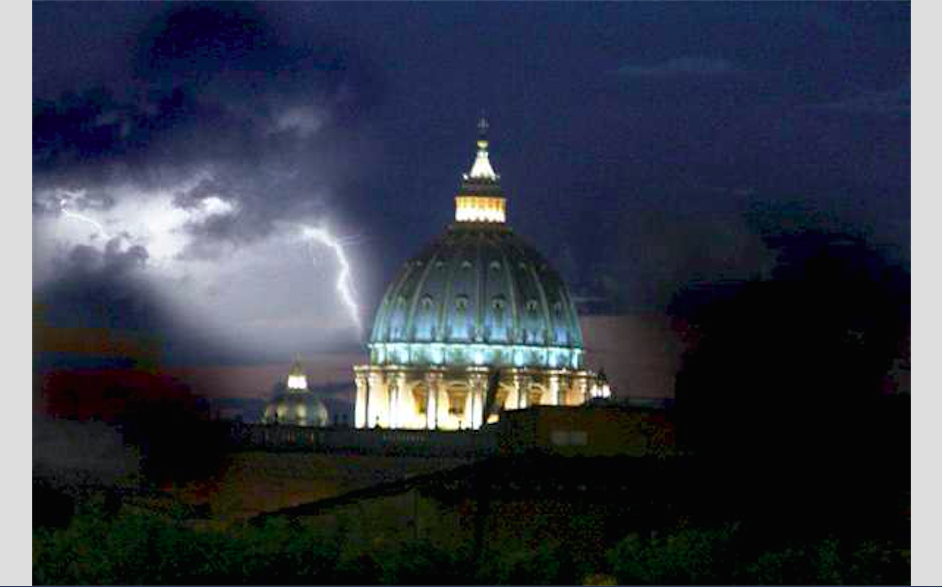by Christopher A. Ferrara
July 26, 2017
The always insightful and often surprising Antonio Socci has just published a piece(translation mine) concerning a little-known but immensely explosive essay by the Italian philosopher Massimo Cacciari, given one month after Benedict XVI’s mysterious renunciation of “the ministry of Bishop of Rome, Successor of Saint Peter… in such a way, that… the See of Saint Peter, will be vacant…”
Alluding to the title of the book Attack on Ratzinger, written three years before Benedict’s “resignation,” Socci suggests that the attack on Benedict XVI, the “rejected rock” (of Peter), which culminated in his abdication, is part of “the final attack on the Catholic Church by the antichristian powers and ideologies of this world.”
Cacciari, Socci continues, calls the Church over which Benedict presided the Kathécon, a Greek word which appears in Saint Paul’s Second Letter to the Thessalonians, meaning the great sign of opposition to the advance of the Antichrist, which has the power to “put the brakes” on that advance. Cacciari maintains that Pope Benedict renounced the “ministry of the Bishop of Rome” because he was convinced that “he could no longer succeed in containing the powers of Antichrist within the Catholic Church. As Saint Augustine said, antichrists are in each of us. This is a key to the decision by Ratzinger, if we want to view it in all its seriousness. His decision is of one piece with the crisis of politics, of the power that brakes [the advance of Antichrist].”
Socci concludes that with Benedict’s renunciation, it would appear that “the Church as Kathécon, that is, as the power that arrests [the Antichrist’s advance], was totally dissolved. Giving the impression of being recruited as a draft horse for the chariot of the Antichrist’s power.” This situation, says Socci:
“signals that we live in a ‘grandiose,’ that is, apocalyptic, time. Whoever still does not understand this acts like the heedless people of which Jesus speaks in Chapter 17 of the Gospel of Luke. These warnings of Jesus, apply always, to all, in every time in which there is reproduced, by analogy, the biblical story, until the appearance of the Son of Man. It seems to me that one must pray much, above all for the Church and her pastors.”
Socci reminds us of one of the many devastating admissions by none other than Paul VI regarding the state of the Church following the introduction of his wave of improvident “reforms,” which doubtless helped unleash the forces within the Church whose effects Paul VI publicly deplored. Quoth Paul:
“There is a great disturbance at this moment in the world and in the Church, and what is in question is the Faith. It happens now that I repeat to myself that obscure phrase of Jesus in the Gospel of Luke: ‘When the Son of Man returns, will he find any faith on the earth?’ Books are published in which the faith is in retreat on important points, and the episcopate remains silent, finding nothing strange in these works. Sometimes I reread the Gospel on the end times and I discern that in this moment there are emerging certain signs of this end. Are we near to the end? This we can never know. It is necessary to hold oneself ready, but everything could go on much longer.“What strikes me, when I consider the Catholic world, is that within Catholicism there sometimes seems to predominate a kind of non-Catholic thought… and it could happen that tomorrow this non-Catholic thought… will be at its strongest. But this will never represent the thought of the Church. There must be a small flock, however small that flock will be.”
Since Paul VI made those astonishing remarks, there has been heaped up a mountain of additional evidence for what has long been obvious from this Fatima perspective: that the Church has entered an epoch of apocalyptic dimensions quite unlike the ordinary course of her history, however troubled that history has been by various crises. To deny this is to fall prey to the delusion of normalcy of which Our Lord warns us in the Gospel of Luke:
“And as it came to pass in the days of Noe, so shall it be also in the days of the Son of man.“They did eat and drink, they married wives, and were given in marriage, until the day that Noe entered into the ark: and the flood came and destroyed them all.“Likewise as it came to pass, in the days of Lot: they did eat and drink, they bought and sold, they planted and built.“And in the day that Lot went out of Sodom, it rained fire and brimstone from heaven, and destroyed them all.“Even thus shall it be in the day when the Son of man shall be revealed. (Luke 17:26-30)”
